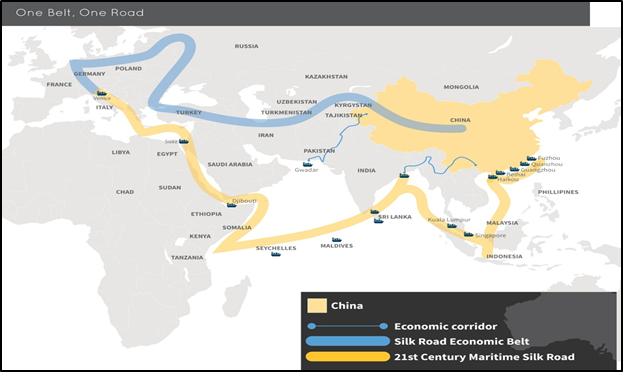In News:
- US President Joe Biden and other G7 leaders formally launched in Germany the Partnership for Global Infrastructure (PGII).
- The 48th G7 summit is being held in Germany.
What’s in Today’s Article:
- Partnership for Global Infrastructure (PGII)- Background, About, Four priority pillars, India & PGII, PGII and China
- China’s Belt and Road Initiative (BRI)
- News Summary
Partnership for Global Infrastructure (PGII)
- At the 2021 G7 Summit, G7 leaders had announced their intent to develop a values-driven, high-impact, and transparent infrastructure partnership.
- It was to meet the enormous infrastructure needs of low- and middle-income countries and support the US’ and its allies’ economic and national security interests.
- At the 2022 G7 summit, the participating leaders formally launched the Partnership for Global Infrastructure (PGII).
- Under this, G7 leaders pledged to raise $600 billion in private and public funds over five years to finance needed infrastructure in the developing countries.
Aim
- To deliver quality, sustainable infrastructure that makes a difference in people’s lives around the world;
- To build infrastructure that strengthens and diversifies supply chains, creates new opportunities, and advances national security of member countries.
Four priority pillars
- Climate and energy security
- Tackling the climate crisis and bolstering global energy security through investments in climate resilient infrastructure, transformational energy technologies.
- Digital connectivity
- Developing, expanding, and deploying secure ICT networks and infrastructure to power economic growth and facilitate open digital societies.
- Gender equality and equity
- Advancing gender equality and equity by investing in
- care infrastructure that increases opportunities for economic participation by women,
- improved water and sanitation infrastructure that addresses gender gaps in unpaid work and time use.
- Health and health security
- Developing and upgrading the infrastructure of health systems and contributing to global health security.
India and PGII
- The US announced several flagship projects under the PGII. One of these projects will back Indian infrastructural initiatives.
- Under this, the US International Development Finance Corporation (DFC) will be investing up to $30 million in Omnivore Agritech and Climate Sustainability Fund.
- This is an impact venture capital fund that invests in entrepreneurs building the future of agriculture, food systems, climate and the rural economy in India.
- The Fund seeks to invest in companies that increase food security and promote both climate resilience and climate adaptation in India.
- It also seeks to improve the profitability and agricultural productivity of smallholder farms.
PGII and China
- The PGII is seen as an attempt to check China’s influence in the developing world by delivering game-changing projects to close the infrastructure gap in these countries.
- It is aimed at countering China’s multitrillion-dollar Belt and Road project.
China’s Belt and Road Initiative (BRI)

- China’s Belt and Road Initiative (also known as One Belt, One Road (OBOR)) envisages the construction of a maze of road, rail and port projects through a number of countries.
- It aims to strengthen Beijing’s economic leadership through a vast program of infrastructure building throughout China’s neighbouring regions.
- This initiative is called “21st century silk road,” and is made up of
- a belt of overland corridors (also known as silk road economic belt)
- a maritime road of shipping lanes.
News Summary
- The G7 group has unveiled Partnership for Global Infrastructure and Investment (PGII) to counter China’s flagship trade-and-infrastructure initiative.
Key Highlights of the summit:
- Partnership for Global Infrastructure and Investment (PGII) launched
- PGII aims to fill a huge gap left as communist China uses its economic clout to stretch diplomatic tentacles into the furthest reaches of the world.
- This partnership plans to raise $600 billion for global infrastructure programmes in poor countries by 2027.
- The target for the U.S. is to bring $200 billion to the table, with the rest of the G7 another $400 billion by 2027.
- The funding for this initiative would depend largely on private companies being willing to commit to massive investments.
- Decided to ban gold imports from Russia
- The US and other G7 countries banned imports of gold from Russia, seeking to undercut a key source of revenue for Moscow as it wages war in Ukraine.
- Russian gold is a major export that rakes in tens of billions of dollars for Russia.
- It would help to further isolate Russia from the international financial system.










